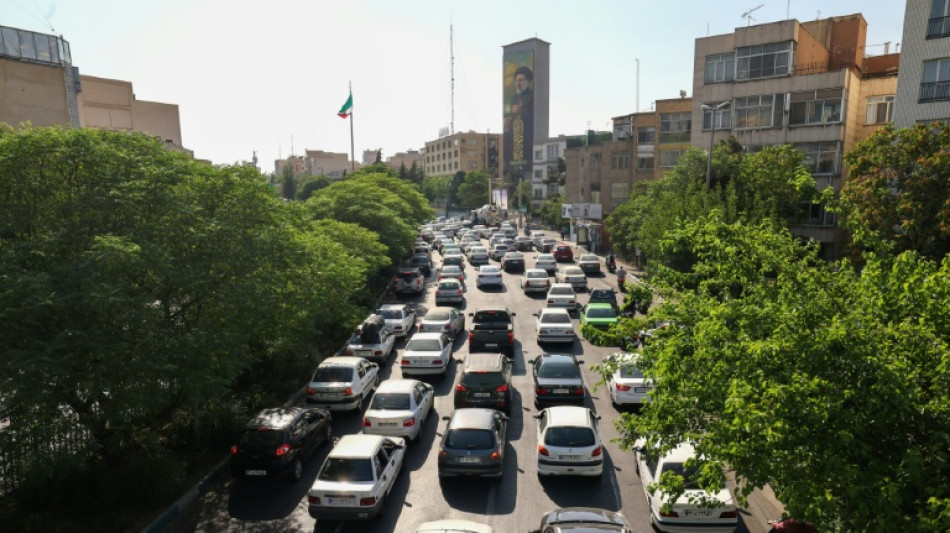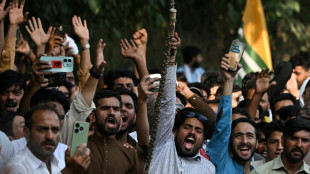
| CMSC | -0.46% | 23.8 | $ | |
| SCS | 0.06% | 17.17 | $ | |
| NGG | -0.69% | 72.36 | $ | |
| RBGPF | 7.2% | 78.22 | $ | |
| BCE | -0.92% | 23.255 | $ | |
| RYCEF | -0.95% | 15.85 | $ | |
| BCC | 0.27% | 77.59 | $ | |
| RELX | -1.23% | 46.5 | $ | |
| VOD | -1.36% | 11.375 | $ | |
| CMSD | -0.21% | 24.34 | $ | |
| RIO | -0.9% | 65.7 | $ | |
| GSK | -2.64% | 44.34 | $ | |
| AZN | -1% | 83.525 | $ | |
| JRI | -0.48% | 14.261 | $ | |
| BTI | 0.1% | 52.33 | $ | |
| BP | -1.47% | 33.96 | $ |
Tehranis caught between fear and resolve as air war intensifies

As Israeli air strikes on Tehran show no sign of abating, many residents have fled the Iranian capital. But for others, escape is not an option.
"I've heard multiple explosions near my home in western Tehran," said Mina, a 37-year-old computer scientist. "I wanted to leave, but I have several cats and I can't abandon them."
Israel launched a devastating attack on Friday that has killed at least 224 people -- including women and children -- leading many parts of the Iranian capital to empty out.
The assault prompted a retaliatory barrage from Iran that has killed at least 24 people in Israel, according to the Israeli prime minister's office.
Israel on Monday warned residents to leave a northern district of the capital before striking the headquarters of state television -- an attack the broadcaster said killed three people.
It came two days after Israel declared it had "opened a path to Tehran" by knocking out Iran's air defences.
But amid the ensuing exodus, those left behind are grappling with fear, shortages and a sense of defiant endurance.
On Tuesday, long queues stretched outside bakeries and petrol stations -- some several kilometres (miles) long -- as remaining residents rushed to stock up on fuel and basic supplies.
Grocery and convenience stores stayed open, but markets and jewellery shops across the city remained closed.
Security checkpoints have been set up across Tehran, adding to the atmosphere of tension as authorities monitor movement in and out of key districts.
- Subdued cityscape -
Traffic in central Tehran was visibly thinner, with sporadic lines forming outside pharmacies.
Images posted online -- though unverified -- showed extensive damage to homes: shattered windows, collapsed facades and debris-filled living rooms.
In Tajrish Square, workers scrambled to repair a water pipeline damaged in an earlier strike, while some residents relocated temporarily to access running water.
"The regime (Israel) must await harsh punishment," read one banner in downtown Tehran, displayed alongside portraits of slain Iranian military commanders and nuclear scientists.
Other banners quoted Iran's supreme leader, Ayatollah Ali Khamenei: "The powerful hand of the Islamic Republic's armed forces will not relent against the Zionist regime."
The banners -— along with headlines from foreign outlets reporting on Iran's retaliation -- dotted an otherwise subdued cityscape.
The Grand Bazaar stayed shut, while a banner in Vali-Asr Square honoured Sahar Emami, the state TV anchor who remained on air during the Israeli strike on the broadcaster's headquarters.
Her image, finger raised in defiance, was paired with a verse from the Persian poet Ferdowsi, celebrating the courage of women "on the battlefield".
While fear grips the capital, what remains is a patchwork of resilience, helplessness -- and an uneasy stillness as many await what comes next.
D.Campanella--INP

 London
London

 Manchester
Manchester
 Glasgow
Glasgow
 Dublin
Dublin
 Belfast
Belfast
 Washington
Washington
 Denver
Denver
 Atlanta
Atlanta
 Dallas
Dallas
 Houston Texas
Houston Texas
 New Orleans
New Orleans
 El Paso
El Paso
 Phoenix
Phoenix
 Los Angeles
Los Angeles



